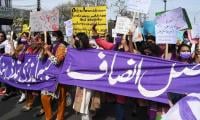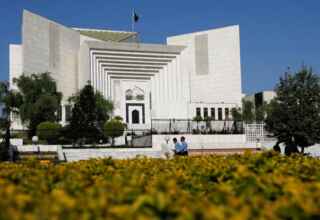
ISLAMABAD/LAHORE: Marches were held in several parts of the country on Wednesday in connection with International Women’s Day in which women belonging to different walks of life raised their voices for equal rights, an end to patriarchal violence and increased representation of women in all levels of decision-making.
In Islamabad, despite police baton charges, roads blocked with containers and barbed wires and unrest created by certain segments, the Aurat March activists managed to keep alive the tradition of starting the march from the National Press Club and walking towards the D-Chowk.
Though the number of people who joined the march this year remained low as compared to the previous years, the level of unrest and resistance from the administration was much higher. A few unfortunate incidents caused injuries to some marchers and media persons covering the march.
The marchers started gathering in front of the National Press Club, chanted slogans, made speeches and geared to march on their traditional route. They were also joined by Afghan women and representatives of the transgender community.
The march organisers presented a list of 60 demands, including an end to patriarchal violence, the increased representation of women at all levels of decision-making concerning climate change, a reduction in the defence budget, increased allocations for health and education, raising minimum wage allocations, and moving away from anti-poor policies of the International Monetary Fund (IMF) and debt traps.
In Lahore, the sixth Aurat March was peaceful at Egerton Road. The security arrangements were good. For the third consecutive year, the venue of the rally was lined with shirts of rape victims with their ages marked on them to impress upon society to fight violence against women. The march chanted slogans such as ‘We are about to demolish patriarchy’, ‘Give us our rights’, ‘Girls want to walk home in safety’ and ‘The world will change when she will rise’. Posters displayed in front of the stage highlighted the reported figures of sexual assaults on women and children.
A number of women, men and transgender persons, young and old, came to the march. The attendance at the march was less as compared to last year. Roadblocks and the imposition of Section 144 created confusion among the people.
A charter of demands issued by the Aurat March asked for mainly three things. One is regular relief to the people displaced by floods, shelter for them, policies that benefit the affected communities such as farmers and fishermen, and climate justice. Aurat March views RUDA as displacing farmers and affecting the crop and water situation.
Two, decent wage for work. There were placards that said, “Minimum wage be fixed at Rs50,000”, “Women at work make the world a better place”, and “We want social security for domestic workers and home-based workers”.
Three, they demanded there should be no amendment to the Transgender Bill 2018. Transgenders have faced much violence in Pakistan while the Constitution gives them all the fundamental rights that men and women enjoy apart from the right to marriage. Women from Balochistan came to raise their voices against oppression and freedom from the shackles of tribal chiefs. There were placards inviting people to know their marriage rights by calling at 1413, others that said ‘you do not have the right to torture your wife’, ‘We want freedom from dowry, from burdensome customs’, ‘Beti dil mein tau beti will mein (If daughter is in the heart, she will be in the will).
A group of women presented a dance on Sufi poet Khwaja Ghulam Fareed’s kalam, another group sang a song in chorus with great vigour, a folk singer from Pakpattan sang a song and a girl recited a powerful poem while another girl played the sitar in the background. In the end, a large number of women sang Urdu version of the poem ‘Rapist is you’ sung in many countries. It was ‘Hum behnain apni taaqat hain’ (We, sisters are one another’s strength).
There was a large contingent of police at the march and a good number of them were young policewomen in the forefront. There were a good number of volunteers in green jackets on the look for miscreants.
Some altercations were heard at a distance from the rally which the security men handled successfully and the speech at the rally went on peacefully.
Youtubers were being told not to push people to talk to them and in the end, the Aurat March organisers thanked the police for controlling the YouTubers.







